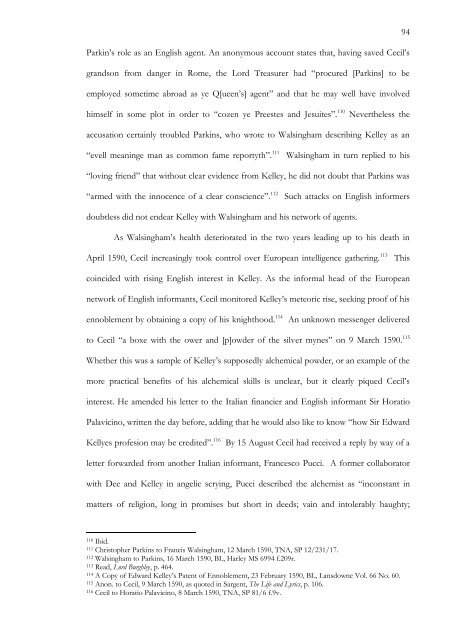The Alchemical Patronage of Sir William Cecil, Lord Burghley
The Alchemical Patronage of Sir William Cecil, Lord Burghley
The Alchemical Patronage of Sir William Cecil, Lord Burghley
Create successful ePaper yourself
Turn your PDF publications into a flip-book with our unique Google optimized e-Paper software.
Parkin‘s role as an English agent. An anonymous account states that, having saved <strong>Cecil</strong>‘s<br />
grandson from danger in Rome, the <strong>Lord</strong> Treasurer had ―procured [Parkins] to be<br />
employed sometime abroad as ye Q[ueen‘s] agent‖ and that he may well have involved<br />
himself in some plot in order to ―cozen ye Preestes and Jesuites‖. 110 Nevertheless the<br />
accusation certainly troubled Parkins, who wrote to Walsingham describing Kelley as an<br />
―evell meaninge man as common fame reportyth‖. 111 Walsingham in turn replied to his<br />
―loving friend‖ that without clear evidence from Kelley, he did not doubt that Parkins was<br />
―armed with the innocence <strong>of</strong> a clear conscience‖. 112 Such attacks on English informers<br />
doubtless did not endear Kelley with Walsingham and his network <strong>of</strong> agents.<br />
As Walsingham‘s health deteriorated in the two years leading up to his death in<br />
April 1590, <strong>Cecil</strong> increasingly took control over European intelligence gathering. 113 This<br />
coincided with rising English interest in Kelley. As the informal head <strong>of</strong> the European<br />
network <strong>of</strong> English informants, <strong>Cecil</strong> monitored Kelley‘s meteoric rise, seeking pro<strong>of</strong> <strong>of</strong> his<br />
ennoblement by obtaining a copy <strong>of</strong> his knighthood. 114 An unknown messenger delivered<br />
to <strong>Cecil</strong> ―a boxe with the ower and [p]owder <strong>of</strong> the silver mynes‖ on 9 March 1590. 115<br />
Whether this was a sample <strong>of</strong> Kelley‘s supposedly alchemical powder, or an example <strong>of</strong> the<br />
more practical benefits <strong>of</strong> his alchemical skills is unclear, but it clearly piqued <strong>Cecil</strong>‘s<br />
interest. He amended his letter to the Italian financier and English informant <strong>Sir</strong> Horatio<br />
Palavicino, written the day before, adding that he would also like to know ―how <strong>Sir</strong> Edward<br />
Kellyes pr<strong>of</strong>esion may be credited‖. 116 By 15 August <strong>Cecil</strong> had received a reply by way <strong>of</strong> a<br />
letter forwarded from another Italian informant, Francesco Pucci. A former collaborator<br />
with Dee and Kelley in angelic scrying, Pucci described the alchemist as ―inconstant in<br />
matters <strong>of</strong> religion, long in promises but short in deeds; vain and intolerably haughty;<br />
110 Ibid.<br />
111 Christopher Parkins to Francis Walsingham, 12 March 1590, TNA, SP 12/231/17.<br />
112 Walsingham to Parkins, 16 March 1590, BL, Harley MS 6994 f.209r.<br />
113 Read, <strong>Lord</strong> <strong>Burghley</strong>, p. 464.<br />
114 A Copy <strong>of</strong> Edward Kelley‘s Patent <strong>of</strong> Ennoblement, 23 February 1590, BL, Lansdowne Vol. 66 No. 60.<br />
115 Anon. to <strong>Cecil</strong>, 9 March 1590, as quoted in Sargent, <strong>The</strong> Life and Lyrics, p. 106.<br />
116 <strong>Cecil</strong> to Horatio Palavicino, 8 March 1590, TNA, SP 81/6 f.9v.<br />
94















